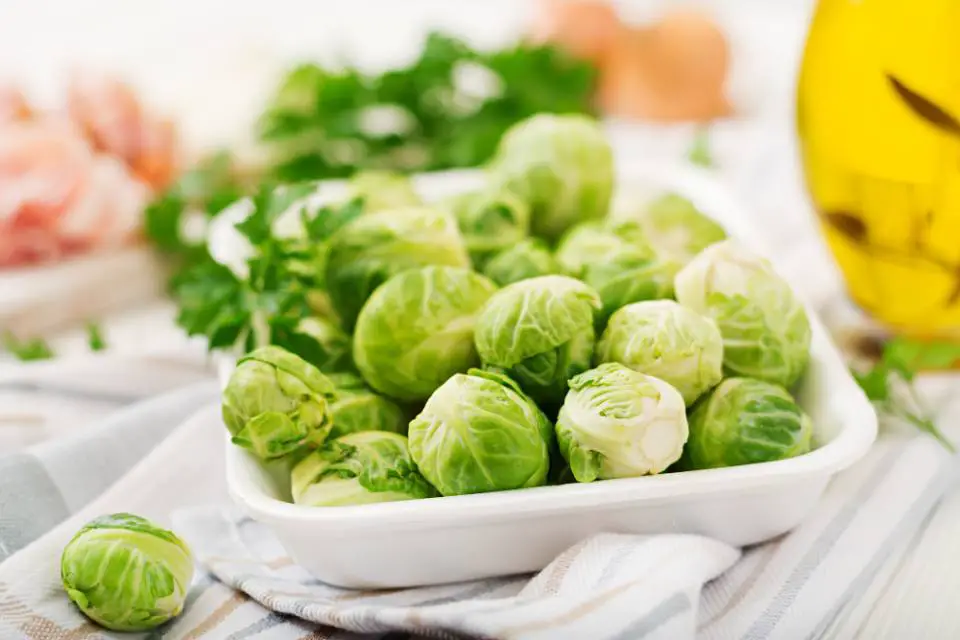Yes, dogs can eat Brussel Sprouts. In fact, they’re a great addition to your dog’s diet because they’re low in calories and high in fiber and antioxidants. They also contain vitamin K and C, which are needed for bone health and a strong immune system.
Benefits of Brussel Sprouts for Dogs
When I first heard of Brussel Sprouts being eaten by dogs, I admit I was a bit skeptical. I decided to do some research (after all, it’s what I do) and discovered some great benefits for your dog.
While they are also high in fiber, vitamins C, A, B1, and B6, as well as manganese, potassium, and folate.
1.) Low Calorie
Brussels sprouts are about 10 calories per cup serving (2g). Compared to other vegetable options, this is great for dogs that need to watch their weight.
2.) High in Fiber
Brussel Sprouts are a great source of fiber. This will help reduce the occurrence of constipation and promote a healthy digestive tract that lead to less frequent visits to the vet.
3.) Antioxidant Properties
Antioxidants neutralize the effects of free radicals and reduce the risk of heart disease, cancer and cell damage in pets. Handpicked Brussel Sprouts will have a higher antioxidant level than the frozen variety because they are picked at peak ripeness.
4.) Vitamin K
Brussel Sprouts are a good source of vitamin K which helps promote bone health.
5.) Vitamin C
Vitamin C is important for your dog’s immune system and helps with the healing process after an injury.
6.) Vitamin A
Vitamin A helps promote eye health, healthy skin and is also important for reproduction in both male and female dogs.
Preparing Brussel Sprouts for your dog
Definitely remove the stem and core of the Brussels Sprout (Throw it away! There’s no nutritional value to it.)
Slice the Brussel Sprouts in half or quarter pieces and cook them; otherwise, dice them first. Use only a little olive oil and definitely don’t add salt. Dogs should not eat garlic or onion either.
Side Effects of Brussel Sprouts
Just like with any food, you’ll want to avoid giving your dog an excess of Brussel Sprouts. In general, one or two small Brussel sprouts would be a safe serving size for most dogs, although if you plan on adding them to his regular diet, limit the amount to no more than once per week.
If they cause any gas he may not enjoy them quite as much.
Brussel Sprouts for Dogs with Allergies and Irritations
If your dog has an allergy to a certain food or if he experiences irritation from a food, then avoid using that food in any form. That would include feeding him Brussel Sprouts if they’re the cause of his allergies or irritation.
Something to keep in mind
Although Brussel Sprouts aren’t harmful to your dog, he might not like the taste of it. This may be the reason why he isn’t interested in them in the first place. Since most dogs won’t willingly choose to eat Brussel Sprouts, I’ve found it best to hide them in your dog’s food.
Vegetables that are good for your dog
Brussel Sprouts aren’t the only vegetable that is healthy for your dog. In fact, you have quite a vegetables to choose from if you want to add some of nature’s goodness to your furry friend’s diet.
1. Carrots
Carrots are great for your dog’s skin and coat. Carrots are a good source of vitamin A and beta-carotene, both of which can help with skin health, as well as improve the glossiness of your dog’s coat. Your dog will also love carrots because they taste delicious.
2. Cabbage
Cabbage is another healthy vegetable that provides many nutrients and minerals for your dog. Cabbage is a good source of fiber, vitamin C, and beta-carotene. Cabbage also contains many antioxidants that help fight free radicals in your dog’s body.
3. Sweet Potatoes
Sweet potatoes are great human food for your dog because they are packed with vitamins and minerals, as well as carotenoids and antioxidants. There are many benefits to feeding sweet potatoes to your dog, some of which include regulating blood sugar levels and improving vision health.
4. Green beans
Green beans can provide a good source of vitamins A, B-6, C, and K for your dog. Green beans are also a good source of fiber and antioxidants. You should avoid serving your dog string beans because they contain oxalates, which can cause oxidative stress in the liver.
5. Pumpkin
Pumpkin is a great source of beta-carotene, which promotes the production of melanin in your dog’s skin. The increased production of melanin in the skin helps to provide a natural sun protection barrier. In addition to being a good source of beta-carotene, pumpkin also provides antioxidants and many minerals for your dog.
6. Broccoli
Broccoli is rich in vitamins A, C, K, D, and E, as well as many minerals and antioxidants. Feeding broccoli to your dog can help improve his digestive health. Broccoli can also help treat bladder and other urinary tract infections in dogs.
7. Cauliflower
Cauliflower can provide many health benefits for your dog because of its high vitamin and mineral content, as well as dietary fiber. Cauliflower can also prevent cancerous cells from developing in your dog’s body, which is why it is important to feed cauliflower to your dog on a regular basis.
8. Green peas
Green peas are a great choice for your dog because they are rich in vitamin B-6, as well as dietary fiber and many minerals. Green peas can also help treat urinary tract infections in dogs because they contain many antioxidants.
9. Spinach
Spinach is another good vegetable you can feed your dog. Spinach is a leafy green vegetable that protects against many types of cancer because of its high concentrations of vitamin C, as well as antioxidants and carotenoids.
It is important to note that spinach should not be given to dogs who have a heart condition.
10. Lettuce
Lettuce is a great source of fiber and many vitamins and minerals such as A, K, and C. Lettuce can also help your dog fight cancer cells by keeping his body free of toxins.
Lettuce should be given in small quantities to your dog because it contains oxalates, which can cause oxidative stress in the liver if not consumed in moderation.
11. Cucumber
Cucumbers can be a good choice for your dog because they are high in vitamin K, calcium, and magnesium. Cucumbers also contain antioxidants that help fight free radicals in your dog’s body.
Feed your furry friend cucumbers in moderation, as they can cause digestive problems if too many are fed at once.
Vegetables your dog should not eat
Dogs can eat vegetables, but you have to choose the right ones. Let’s have a look at vegetables that should be avoided.
1. Onion
Onion is a very dangerous vegetable for your dog to eat. Onions contain toxins that can negatively affect your dog’s red blood cells and cause hemolytic anemia.
You should never feed your dog onion, no matter how small the amount may be. Your dog may also start to exhibit symptoms of anemia if onion is eaten in large quantities.
2. Peppers, hot and sweet
Hot peppers contain capsaicin, which can cause stomach ulcers and other health problems in dogs. Sweet peppers also contain capsaicin, as well as oxalates. Feeding your pup a large number of peppers will cause inflammation of the stomach lining or intestines, depending on the type of pepper consumed.
3. Garlic
Garlic contains sulfoxides, which can cause anemia. Eating too much garlic can also cause stomach irritation and damage to the heart, liver, and kidneys. Garlic is not a good vegetable to feed your furry friend on a regular basis because of its negative effects on your dog’s health.
4. Mushrooms
Mushrooms are toxic to dogs and must never be fed to your dog. Mushrooms can cause seizures, coma, and even death. Your dog may also exhibit gastrointestinal symptoms such as diarrhea, vomiting, or black stools if he consumes a large number of mushrooms.
5. Rhubarb leaves
Rhubarb leaves are a poisonous vegetable that should be avoided at all costs. Rhubarb leaves contain oxalates, which can cause intestinal irritation or an upset stomach if too much is fed.
Conclusion
Yes, dogs can eat Brussel Sprouts. If you’re a dog owner, this probably sounds like good news. You’d never let your dog eat those mushy nuggets of green supervillain lettuce, but maybe it’s okay to let him have some Brussels Sprouts. Well, it’s actually important that you do.
The vitamin and fiber content of Brussel Sprouts give your dog’s digestive system a little pick-me-up (but don’t give him too much). It also helps improve the immune system and ward off cancer if that’s an issue for your pooch.


